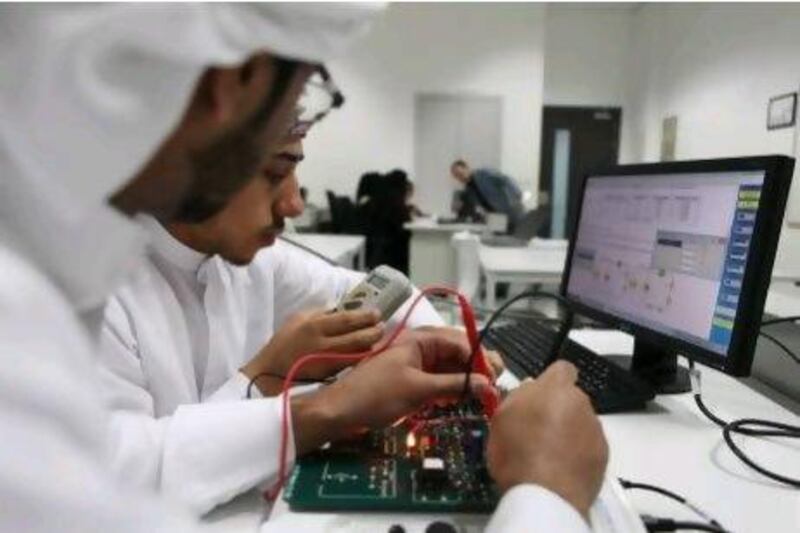ABU DHABI // It is a year since Abu Dhabi Polytechnic opened its doors to a future generation of nuclear and semiconductor technicians.
The institution was created to turn its Emirati students into the expert pioneers of the industries earmarked to take Abu Dhabi beyond the age of oil.
And unlike some other universities that have to deal with 20 per cent of their students dropping out in the first year alone, the college, run by the Institute of Applied Technology, has retained 90 per cent of its first intake.
Of the 113 students, 12 are women. All the women are taking a higher diploma in semiconductors - which should result in jobs that are more culturally suitable than those in the nuclear sector.
Many of the men, though, have switched to the nuclear course. The motivation is largely financial: students on the nuclear course all receive handsome sponsorship from Emirates Nuclear Energy Company.
All students at the polytechnic are paid a monthly grant of up to Dh4,000, depending on their grades and attendance record. Anyone missing 10 per cent or more of classes is docked Dh500.
But on top of that, Enec offers the nuclear students an annual bonus while studying of up to Dh60,000 - again linked to grades. After graduation, there are guaranteed well-paid jobs.
"Enec's seen as an employer much like Adnoc [Abu Dhabi National Oil Company]," said Habib Ahmed, head of student services. "It's a good long-term opportunity for the students."
Ahmed Al Zahmi, 19, from Fujairah, lives in the free accommodation by the college. His high marks have earned him the full Dh4,000-a-month grant, and he is on course for a Dh60,000 bonus.
Not only has he enjoyed his first taste of living away from home, he is managing his own finances for the first time.
"It motivates me to do well," he said. "Dh2,500 goes into the bank each month and I live off the Dh1,500. It has helped me to manage money."
Fatima Saleh Ramsi, 19, left her degree in chemical engineering at the Petroleum Institute in Abu Dhabi, which would have guaranteed work with Adnoc, to study on the semiconductor course. By the time she graduates, the course will have been upgraded to degree level, adding a year to the three-year diploma course.
"I was only at PI because that's what my parents wanted me to do," she said. "This is much more what I want.
"It's been really interesting and it's been very challenging. I'm very glad I came here. At PI it depended much more on very academic ways of learning, but here, it's more practical than theoretical. We have more laboratory time. Study is 75 per cent practical."
From the start, students go on local field trips to immerse them in the world of work, preparing them for work placements abroad.
The nuclear students will spend between six months and two years working in Korea, and the semiconductor students will go to plants in the United States, Germany or Singapore. The semiconductor placements are set up by the state-owned Advanced Technology Investment Company, which is building Abu Dhabi's new microchip plants.
The students are all eager to be known as the pioneers of the country's post-oil future. "We need to look for other forms of energy, solar, nuclear," said Abdulaziz Bani Hashim, 19. "The UAE is totally dependent on oil right now. Nuclear is the future for the UAE."
In September, the polytechnic will move into its new campus in Mohammed bin Zayed City. It will offer more courses, with information security technology engineering and petrochemical engineering, aiming to fill the 5,000 to 10,000 vacancies Adnoc expects to have over the next two years.
Mr Ahmed expects student numbers to jump to about 400 in September. Word has spread quickly, he says, and the hands-on study combined with guaranteed employment make it an attractive option.
"There is a lot waiting for us," agrees Mr Hashim.






